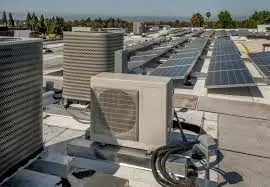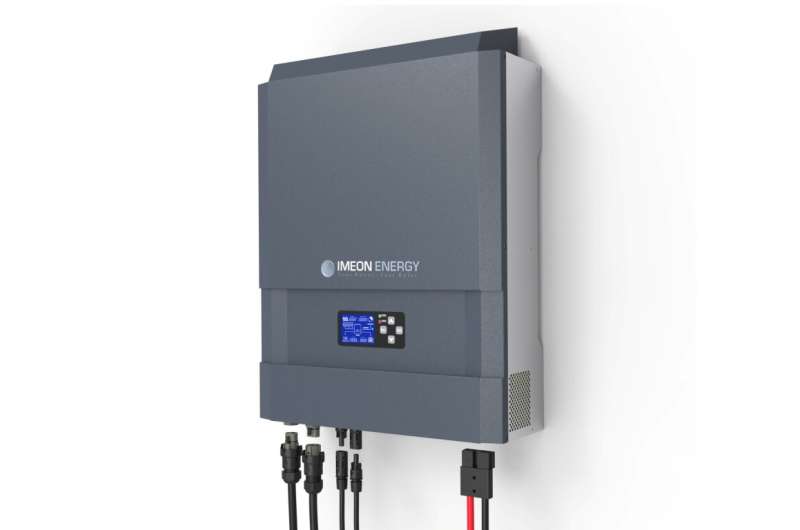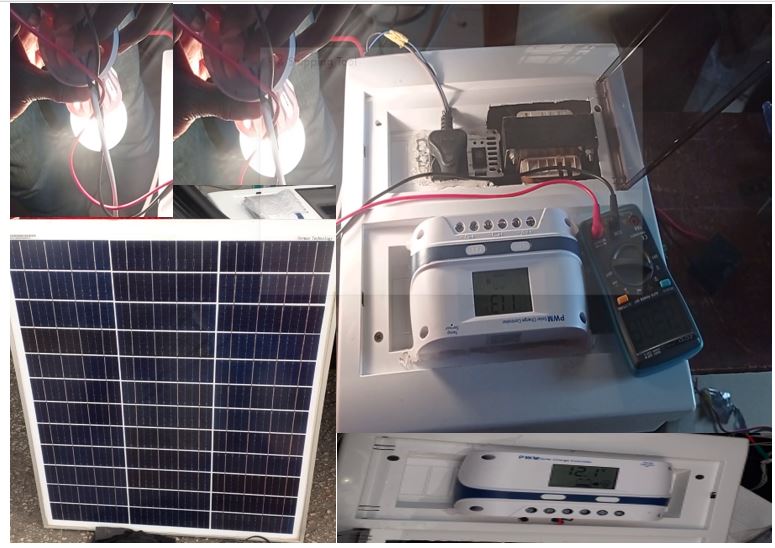Introduction: Can Solar-Powered Air Conditioning Really Save You Money?
:max_bytes(150000):strip_icc()/rooftop-hvac-installation-with-solar-panels-489904512-dbde611888dd4982ac3fa055d245e5a0.jpg)
If you’re anything like most people, the thought of air conditioning brings images of cool relief during those hot summer days. But did you know that running air conditioning can also bring shockingly high energy bills? That’s where solar-powered air conditioning comes in. Imagine cooling your home with efficient cooling through solar power while also slashing your electricity costs and reducing your carbon footprint. Sounds like a dream, right?
But is it really worth the investment? Can a solar-powered AC system truly deliver on its promises of cost savings and environmental benefits? In this article, we’re diving deep into the pros and cons of solar-powered air conditioning, and helping you figure out if it’s the right choice for you.
What is Solar-Powered Air Conditioning?

Before we jump into the financials and practicality, let’s make sure we’re all on the same page about what a solar-powered air conditioner actually is.
In the simplest terms, a solar-powered air conditioning system uses solar panels to generate the electricity needed to cool your home. Unlike traditional air conditioners, which rely solely on grid power, these systems harness the energy of the sun to reduce the amount of electricity you need to pull from your utility provider.
So, while your traditional AC unit might send your utility bill skyrocketing, a solar-powered system is designed to offset those costs by utilizing solar energy—making it an environmentally friendly, long-term investment.
How Does Solar-Powered Air Conditioning Work?
Here’s the breakdown:
1. Solar Panels Generate Energy
Solar panels, usually installed on your roof, collect sunlight and convert it into electricity. This is called solar photovoltaic (PV) energy.
2. Energy Powers the AC Unit
The electricity generated by the solar panels is used to power the air conditioning unit directly, or it can be stored in batteries for later use, depending on your system.
3. Excess Energy Goes to the Grid (Optional)
If your solar system produces more energy than you need, it can be fed back into the grid. In some regions, this can even earn you credits or compensation through a process called net metering.
Benefits of Solar-Powered Air Conditioning
Now that we know how it works, let’s explore the benefits of switching to solar-powered air conditioning.
1. Significant Energy Savings
One of the biggest advantages of solar-powered air conditioning is the potential for huge savings on your electricity bill. Depending on your solar system’s size and your local climate, you could see a reduction of up to 50% or more in energy costs.
Imagine having cool air all summer long without worrying about the sky-high electricity bills. Sounds like a win-win, right?
2. Environmental Impact
By using solar energy, you reduce your reliance on fossil fuels and decrease your home’s carbon footprint. Solar-powered air conditioners are a sustainable choice for those looking to live more eco-consciously and reduce their environmental impact.
3. Increased Property Value
Investing in solar technology often increases your property value. Homebuyers are more likely to be attracted to homes that have energy-efficient features, and solar-powered systems are seen as an appealing, modern upgrade.
4. Energy Independence
Using solar power to run your AC helps you become less reliant on your local utility company. This gives you more control over your energy costs and makes you more resilient to fluctuating electricity prices.
Drawbacks of Solar-Powered Air Conditioning
While solar-powered air conditioning offers several advantages, it’s important to consider the potential drawbacks as well.
1. High Initial Installation Costs
One of the biggest barriers to solar-powered air conditioning is the initial investment. Solar panels, batteries (if you choose to have one), and installation can cost several thousand dollars, depending on the size of your home and the complexity of the system.
2. Space for Solar Panels
For a solar-powered air conditioning system to work effectively, you’ll need adequate roof space for solar panels. If your roof is small or has limited sun exposure, this could impact the system’s efficiency and make it harder to achieve significant savings.
3. Not Always Reliable Without Sunlight
Although solar-powered AC systems can run entirely on solar energy, cloudy days or nighttime may require you to use grid power or rely on stored energy. Without sufficient sunlight, your system may struggle to provide enough energy to keep your AC running efficiently.
4. Maintenance Costs
While solar systems are generally low-maintenance, they can still require periodic cleaning, inspections, and repairs. If something goes wrong with the system, the repair costs could add up.
Is Solar-Powered Air Conditioning Worth the Investment?
Now, let’s tackle the most important question: Is it worth it? To help you decide, we’ll break it down into a few key factors.
1. Financial Considerations
If you live in an area with high electricity rates and plenty of sunshine, the financial benefits of solar-powered air conditioning are much more evident. You could potentially recoup your initial investment within 5 to 10 years through energy savings, and then enjoy free energy for the life of the system (typically 25 years or more).
Additionally, many countries and states offer tax incentives or rebates for solar energy systems, which can help offset the upfront costs.
2. Energy Usage
If you use a lot of air conditioning and your energy bills are consistently high, switching to solar-powered air conditioning could be a smart move. The more you use your AC, the more you stand to save by switching to solar.
However, if you rarely use your AC or live in a cooler climate, the savings may not justify the high upfront costs.
3. Long-Term Benefits
Even though the initial investment is substantial, the long-term benefits are undeniable. Once your system is paid off, your cooling costs could be significantly lower, and you’ll be contributing to a greener planet by reducing your carbon footprint.
How Much Does Solar-Powered Air Conditioning Cost?
The cost of a solar-powered air conditioning system depends on several factors, including the size of your home, the type of system you choose, and your location. On average, homeowners can expect to pay between $10,000 to $20,000 for a full installation of solar panels and a solar-powered AC system.
While that’s a hefty price tag, you’ll be saving money in the long run through reduced electricity bills, so it can be a wise investment if you plan to stay in your home for several years.
Can Solar-Powered Air Conditioning Work in Any Climate?
The short answer is yes—but it works best in sunny climates. If you live in an area with lots of sunlight, like the Southwest United States, or regions that experience long, hot summers, solar-powered air conditioning is a great option. You’ll get the most efficient cooling with solar power in places where the sun shines consistently. However, in cooler, cloudier climates, the system may struggle to produce enough energy to power your AC reliably.
How to Maximize the Efficiency of Your Solar-Powered Air Conditioning
If you decide to go solar, there are a few strategies to maximize the efficiency of your system:
- Choose a high-efficiency AC unit – Pairing your solar system with an energy-efficient AC unit will help maximize savings.
- Ensure your home is well-insulated – Proper insulation reduces the amount of cooling required.
- Optimize your solar panel placement – Work with your installer to ensure your panels get optimal sun exposure.
Maintenance and Longevity of Solar-Powered Air Conditioning
Once your solar-powered air conditioning system is up and running, it’s important to stay on top of regular maintenance to keep it working efficiently. This includes cleaning your solar panels, checking the inverter, and having the AC unit serviced periodically. Staying consistent with upkeep ensures efficient cooling with solar power and extends the life of your system.
Crime and Haute Couture: The Most Stylish Criminals in History
Conclusion: Should You Invest in Solar-Powered Air Conditioning?
If you’re looking for a long-term, sustainable way to cool your home and reduce your energy costs, solar-powered air conditioning is a smart choice. While it comes with a hefty upfront cost, the potential for significant savings, reduced environmental impact, and long-term benefits make it worth considering.
Just be sure to assess your home’s energy usage, climate, and budget before making the jump. If the numbers add up, you’ll be enjoying efficient cooling with solar power—and lower bills—for years to come.
Detail and Despotic Direction: Cinema’s Most Meticulous and Tyrannical Filmmakers
FAQs
1. Can solar-powered air conditioning be used in any home?
Yes, but it depends on your home’s roof size and solar exposure. Homes with limited roof space or shading may need a more customized setup.
2. How much can I save with solar-powered air conditioning?
Savings can vary, but many homeowners report a 50% reduction in their cooling costs after switching to solar.
3. How long does it take to break even on a solar-powered AC system?
Typically, it takes 5 to 10 years to recoup the initial investment, depending on your location and energy usage.
The Impact of Korean Dramas on International Streaming Platforms
4. Do I need to have battery storage for a solar-powered AC system?
No, but battery storage can help provide energy during nighttime or cloudy days, improving the reliability of the system.
5. Are there tax incentives for installing solar-powered air conditioning?
Yes, many states and countries offer tax credits or rebates for installing solar energy systems, including solar-powered AC.
Korean Celebrities Who Are Known for Their Athletic Abilities


